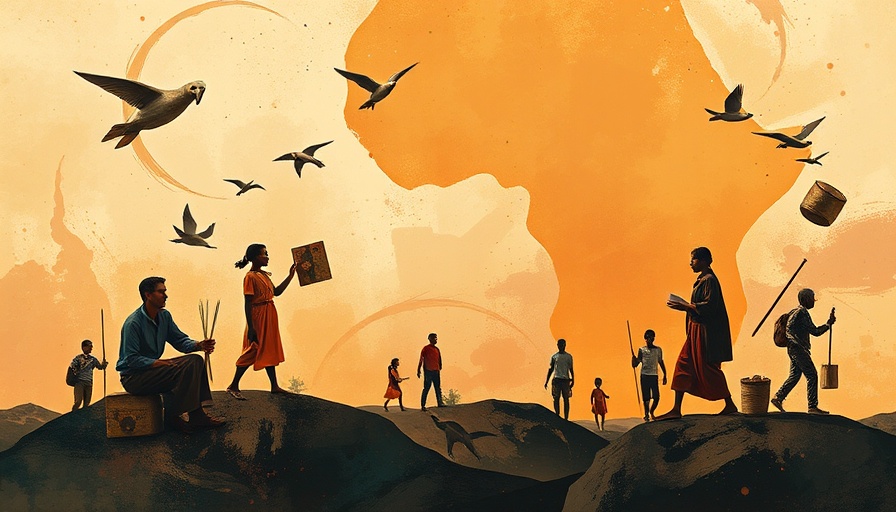
UN Faces Major Setbacks as Funding Cuts Hit Vital Aid Efforts
The humanitarian crisis in southern Africa has taken a severe turn as the United Nations consolidates its operations in response to significant funding cuts from the U.S. government. As a direct result of the recent USAID cutbacks, the UN's World Food Program (WFP) is forced to close its southern Africa regional office in Johannesburg, merging operations with East Africa in Nairobi, Kenya. This staggering shift comes at a time when more than 27 million people in southern Africa are grappling with hunger due to devastating drought conditions.
Impact of USAID Cuts on African Communities
In stark figures, the U.S. is responsible for nearly half of WFP’s annual budget. A reported $4.4 billion contribution last year is set against a backdrop of impending aid reductions totaling more than $60 billion globally. This shift strikes at the core of many humanitarian programs across Africa, leaving vulnerable populations exposed to worsening nutritional deficiencies and health crises. Experts warn that the ripple effects of these funding cuts could drive an additional 5.7 million Africans into extreme poverty by next year, further destabilizing a region already under economic duress.
The Bigger Picture: Closing Doors to Humanitarian Aid
As regions like southern Africa brace for worsening conditions, the broader implications of U.S. aid reductions are becoming clearer. The International Organization for Migration (IOM) has already laid off 3,000 staff due to a lack of funding for refugee resettlement programs, indicating a systemic issue that could spiral into larger public health and security crises. Critics argue that the Trump administration's strategy to focus federal spending on domestic agendas, while sidelining international aid, undermines global health initiatives and escalates poverty.
Global Responses and Alternatives
With the U.S. cutting back, countries like Germany and the UK are also shrinking their aid commitments, pushing many non-profit organizations into a corner. While some are advocating for the emerging economies of Africa to boost local revenue and reduce dependency on foreign aid, the transition is fraught with challenges. As funding wanes, the focus should now pivot to fostering sustainable economic initiatives, technological innovation, and agricultural resilience, particularly in sectors heavily reliant on external assistance.
Encouraging Local Solutions Amidst Funding Drought
Increased focus on digital transformation and technology-driven solutions—such as agritech and renewable energy—could offer pathways to mitigate the fallout from reduced funding. For instance, investing in smart farming technologies can greatly enhance agricultural productivity, detailed analysis shows. Thus, bridging the digital divide through tech education and local entrepreneurship is emerging as a necessary response to these changes.
Engagement of Global Stakeholders
The UN and its agencies are exploring various avenues to maintain operational continuity, including negotiating for waivers that might allow limited U.S. funding to persist. It is imperative that the international community unites to confront these crises, not merely with rhetoric but with impactful actions that reflect a renewed commitment to aid effectiveness and sustainability. Concepts like tech-based collaboration and targeted investments—such as in infrastructure or educational programs—should be at the forefront of discussions amongst governments and aid organizations alike.
A Call for Change: Refocusing U.S. Aid Policy
The current trajectory of U.S. foreign aid policy under the Trump administration raises critical questions. Amidst cuts that disproportionately affect essential services, there must be a re-evaluation of priorities that not only secures American interests but also upholds humanitarian values. Strengthening partnerships, embracing local solutions, and reconsidering the nature of multi-national aid can lead to more resilient communities globally.
Conclusion: A Collaborative Path Forward
As southern Africa confronts the dual challenges of drought and dwindling aid, it is crucial for both local and international entities to innovate solutions and maintain commitment to humanitarian principles. In a time of crisis, fostering resilience through collaboration, technology, and local engagement can yield positive outcomes for millions of affected lives. The need for immediate and effective action cannot be overstated—now is the time for businesses, governments, and nonprofits to step up and make a meaningful difference.
 Add Row
Add Row  Add
Add 




Write A Comment